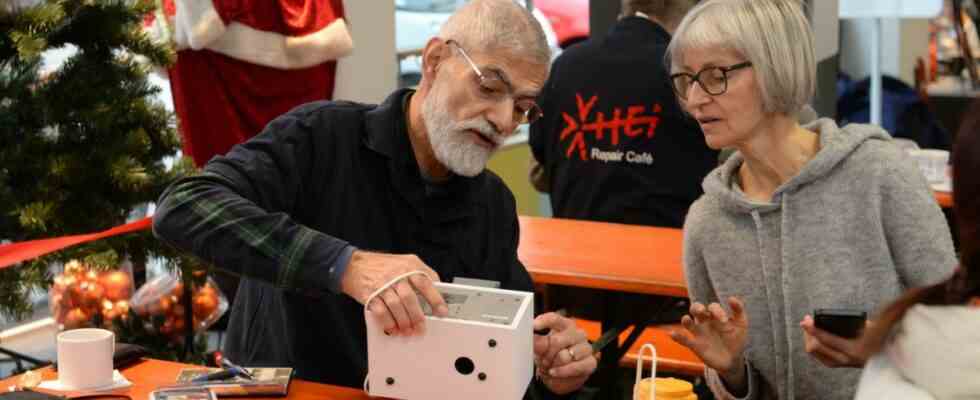A designer radio from the Tivoli brand is standing in front of Michael Schmidl. In theory, the device has a good sound – if one were to be heard. But the radio doesn’t make a sound anymore. Which is why the owner, Christine Hauser, packed up the good piece on Saturday morning and drove it to the Repair Café in Pasing. Repairman Schmidl knows after just a few minutes: It’s not the volume control. More likely on the power supply, which crackles suspiciously. “These are probably the capacitors,” says the man who, as a graduate engineer in electrical engineering, develops and builds such equipment.
He writes down the exact name of the parts that Hauser should order online for little money. He will then solder the new capacitors on the next opening day of the Repair Café. “In the hope that the radio will then start making sounds again,” he says and laughs. Schmidl is one of six inventors who volunteer for four hours on this day in Hall 2, the Munich second-hand department store at Peter-Anders-Straße 15, to try to get defective things running again.
The rush is manageable, because the Pasinger branch is new: the Hei-Reparatur-Café was previously only to be found in the house of self-work in Haidhausen and in the traffic center of the Deutsches Museum. And there is actually a lot going on at these well-established appointments: the mostly ten tech-savvy helpers look at around 60 objects per appointment, including lamps, vacuum cleaners, battery chargers, hair dryers, toasters, flat screens and consumer electronics. With a good success rate. 50 to 60 percent of things then work perfectly again.
There are even specialists for watches and fashion jewellery. Elisabeth Redler is convinced that this keen interest will soon also be part of everyday life in Pasing. Ten years ago, the now 73-year-old brought the idea of the repair café to Munich – as the second of its kind in Germany. “The first time there were six repairmen for every two guests,” she remembers with a smile. But that changed quickly, a short time later there were already a hundred visitors. One expanded, other groups took over the idea. There are now more than 30 repair initiatives in Munich alone. And at least as many in the surrounding area.
Michael Schmidl sometimes prints out missing parts with his 3D printer.
(Photo: Robert Haas)
The new location in the used goods department store was suggested by the municipal waste management company, which wants to focus more on repairs in the future as part of the zero-waste strategy. The department store will also have branches in other districts in the coming year. Where is still open. For Michael Schmidl, who has been supporting the Hei-Repair-Café once a month for four years, the anti-consumption idea is the driving force behind the triumph of the repair concept. “I believe that it’s not just the cost that brings people to us, but above all the appreciation of their devices, which have become dear to them and which they therefore want to continue using.”
Recently, says Elisabeth Redler, more and more customers with fan heaters have come to the Hei-Repair-Cafés. The ever-increasing cost of living has not yet caused a noticeable increase in inquiries, “but we are noticing the social development in the properties.” Of course, the colleagues would have tried to get the heaters going again. “At the same time, we told people that it wasn’t the cheapest way to heat.”
Michael Schmidl remembers a woman whose 30-year-old mixer could no longer mix anything. But she definitely wanted to keep the device because the cutting tool was so good. Schmidl found that the reason the kitchen utensil stopped working was a broken ring. “I then took the thing home and used my 3D printer to reconstruct the ring, which was no longer available for sale. It worked great.” Another time, a 10-year-old boy came to him with a broken plastic toy lightsaber. A wire was broken and had to be soldered. “The look from the little one when the thing lit up again was awesome.”
Typical equipment for the helpers: a pressure cooker.
(Photo: Robert Haas)
Children are particularly grateful when their favorite toy works again: here the controller handle of a car racetrack.
(Photo: Robert Haas)
While he is talking, Jörg Lockenwitz is sitting at the next table. The senior has brought his old record player, a 1970 model. “I’m attached to the device,” he says, “I built the housing and the speakers myself.” Repairman Ulrich Scharmer, a doctor who studied electrical engineering for a few semesters and “was a hobbyist all his life”, managed to repair the purely mechanical system so that it can play records. A German teacher, Joachim Scheibe, is also among the technicians. He takes care of a pink Polaroid camera whose sliding mechanism is broken.
Many Ukrainians have been among the guests in recent months, “with devices ranging from electric toothbrushes and bicycle lights to a Playstation.” One of the Ukrainians, an engineer who spoke German very well, helped out twice with repairs. “That’s how,” smiles Elisabeth Redler, “the world comes to us”.
In 2023, the Hei-Repair team will be in the Haus der Eigenarbeit six times, five in the traffic center and four times in Hall 2. Repairs are made on a donation basis, pre-registration is not required. The acceptance of defective items ends one hour before the end of the day. Only one device may be brought in per person. Excluded are large appliances such as refrigerators or washing machines, microwave ovens, tube televisions and inkjet printers.

